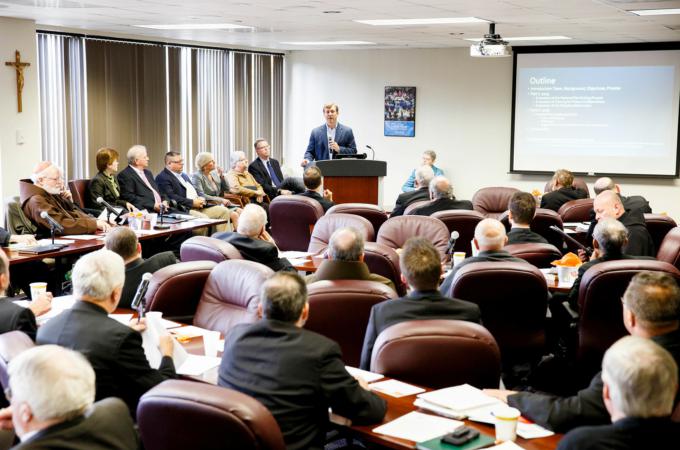Pastoral Planning Advisory Board presents findings to Presbyteral Council
BRAINTREE -- For the first time since it was formed in 2014, the Pastoral Planning Advisory Board (PPAB) presented its report on how Disciples in Mission is working in the Archdiocese of Boston to the Presbyteral Council, Oct. 13.
Consisting of seven laypeople and one priest, the PPAB was formed to evaluate Disciples in Mission, the pastoral plan for the archdiocese.
Typically, the PPAB has presented its findings only to Cardinal Seán P. O'Malley, rather than to the Presbyteral Council, which is the group of clergy that advises the cardinal in the governance of the Archdiocese of Boston.
The PPAB is "a group appointed by the cardinal, which is really important because they are actually evaluating the pastoral planning process for him," said Sister Pat Boyle, associate director of the archdiocese's Pastoral Planning office and an advisor to the PPAB alongside Father Paul Soper.
According to Sister Pat, the cardinal wanted the group to present to the Presbyteral Council after members of the council expressed interest in seeing the process behind how Disciples in Mission is evaluated.
Disciples in Mission was set into motion in 2012 by Cardinal O'Malley with a goal of conserving parish resources to allow them to better focus on evangelization. To do that, the 288 parishes of the archdiocese are being organized into 135 collaboratives over the course of many years.
As the name suggests, a collaborative is a grouping of one, two, or three parishes that work together towards the goal of evangelization. A collaborative has one pastor, one pastoral team, and one set of assigned priests and deacons.
During the Presbyteral Council meeting, the PPAB presented the council with a report in two parts. Part one of the report was finished and submitted to the cardinal in 2015, while part two of the report was finished and submitted in 2016.
For part one of the report, the PPAB had evaluated several Phase One and Phase Two parishes and collaboratives, with Phase One referring to parish collaboratives that began the pastoral planning process in 2013, and Phase Two referring to parishes and collaboratives that began it in 2014.
In particular, the PPAB evaluated how collaboratives viewed the process of training staff and writing their local pastoral plans. The board also asked parishioners in 40 parishes and collaboratives to use a survey tool called the Disciple Maker Index (DMI).
Developed by the national organization The Catholic Leadership Institute, the DMI asks parishioners through a number of questions to reflect on their spiritual growth and identify the ways their parishes or collaboratives and foster that growth. Parishioner's anonymous answers can then be compared to similar parishes on both the local and national level, and used to help guide pastors and parish leaders in making decisions for the future of the parish.
The PPAB found that the DMI can be considered a "useful tool," yet noted that more work needs to be done to use the results of the survey in constructive ways.
Additionally, through a series of interviews, the board found that training in the collaboratives was viewed as necessary and as something that brought the collaborative together. Yet, it also found that participants lacked a full understanding of what Disciples in Mission is.
The PPAB noted that after these findings, changes to the training process were made.
For the second part of the report, the PPAB evaluated eight collaboratives on what they felt is working with the pastoral planning process, as well as what they felt needed to be changed.
By interviewing parishioners and staff, the PPAB found that all eight collaboratives believe the pastoral plan is necessary, that evangelization is an intentional part of the plan, and that they are now more welcoming and hospitable since Disciples in Mission has started.
Additionally, the PPAB found that many of the collaboratives believe their faith formation and religious education programs have changed and are being positively received, and there is an enhanced Sunday liturgy.
However, the report noted that many of the collaboratives also felt that the pastoral plan is difficult to implement, particularly because it requires the collaboratives to complete too many goals in too little time.
It found that collaboratives also believe there is a lack of financial support to complete those goals, a problem that is exacerbated by a lack of volunteers willing to commit long-term efforts.
Additionally, the report noted, the collaboratives believe that more could be done to educate both parishioners and staff on what Disciples of Mission is.
To alleviate these challenges, the collaboratives offered a bevy of recommendations, including more training for staff and volunteers, more time to implement pastoral plan changes, fewer goals, and additional communication on the pastoral planning process and what it is.
Speaking to The Pilot after the meeting, Sister Pat noted that as part two of the report was completed only recently, the Pastoral Planning office is still discussing how the results of the report will be addressed.
In the Oct. 14 post of his weekly blog, Cardinal O'Malley noted that the ongoing evaluation is being taken "very seriously," and changes have already been made to the Disciples in Mission process based on the reports.
"However, it's also obvious, according to the interviews the board has conducted, that the process is energizing people and helping parishes to focus more on evangelization, welcoming people and outreach. We are certainly seeing that those themes are resonating with our parishioners," he said.



















